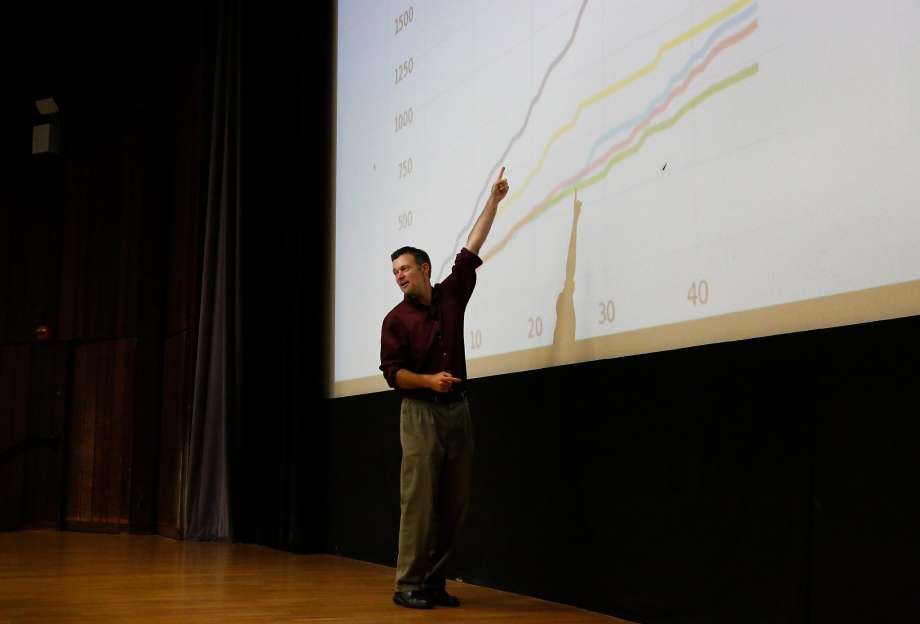Source – sfchronicle.com
In spring 2016, UC Berkeley’s first Foundations of Data Science course attracted around 300 students. This semester, nearly 1,000 have enrolled — and university officials are working to create a data science undergraduate major, the first new major for the College of Letters and Science in at least 16 years.
“No program has grown this fast at Berkeley,” said David Culler, interim dean of the Division of Data Sciences, which was established in December. The first students could graduate with a data science major as early as May next year, he said, and certainly by 2019 (a minor is also planned).
Across the UC system, campuses are quickly adding data science programs in response to soaring workplace demand. UC San Diego is starting a data science undergraduate major and minor this fall. UC Davis opened a statistical data science track within its statistics major effective this year. And at UC Santa Cruz, a new D3 Research center — short for Data, Discovery and Decisions — pairs students with companies to work on research projects using data science skills.
UC Irvine was the first in the University of California system to create a data science major in fall 2015.
“This is the national conversation at pretty much all of the leading universities,” Culler said.
Data science uses the modeling and analysis skills of statistics combined with the programming and machine learning tools of computer science to find patterns in data and extract insights. But the third element that makes data science unique, according to Cathryn Carson, faculty lead for the program, is the need for expertise in a particular field of inquiry — which could be anything from medicine to linguistics to economics.
Sam Lau, 21, was a teaching assistant in fall 2015, when Berkeley tested a pilot of its data science course, in which around 100 students enrolled. “At first, I totally thought data science was a buzzword — one of the words people made up to describe people who know machine learning and statistics and all that stuff,” he said.
Now Lau, who taught the course this summer, thinks data science is an essential skill and is particularly impressed by how the class attracts students of all backgrounds. Recently, the data science foundations course attracted more economics majors than computer science students, Culler said.
The Cal course teaches statistical thinking and coding using the programming language Python. Around half the students also enroll for “connector courses” that apply data science skills to topics like smart cities or literature. Companies including Microsoft, Intel and Google are providing funding for the university’s data sciences division and cloud services for its classes, Culler said.
The job title “data scientist” topped Glassdoor’s 50 Best Jobs in America for the second consecutive year in 2017. Data engineer and analytics manager both cracked the top five. A studythis year co-authored by IBM projects that the demand for data scientists and data engineers will grow 39 percent by 2020, when the number of annual job openings for data professionals reaches 2.72 million.
“We hire data scientists all the time,” said Jon Rooney, head of product marketing at Splunk, a San Francisco company that sells data analytics software. Machine-learning algorithms can automate some analyses and lower the training barrier for employees working with data, but many companies will still need a “vanguard” of skilled data scientists, he said.
Michaela Palmer, a UC Berkeley fourth-year student majoring in geography, said taking the introductory data science course “was life-changing, honestly.” Palmer hopes to work on geospatial data analytics after graduation, and is considering pursuing a graduate degree in computer science. “Data is everywhere,” she said. “Knowing how to handle it is such an important skill.”
In addition to its new undergraduate major and minor, UC San Diego is creating a data science institute, funded largely by a $75 million donation this year from Taner Halicioglu, an alumnus who was Facebook’s first full-time hire after its founders.
“You launch a new major maybe once a decade, once every two decades,” said Rajesh Gupta, a UC San Diego professor who chaired the computer science and engineering department during the creation of the data science program. “This has to last for a very long time … regardless of what’s needed in the market today.”
Gupta believes the last new major at UC San Diego was nanoengineering — which admitted its first freshman class in 2010, according to the department’s website. He said the data science program could offset some of the overwhelming enrollment in computer science classes.
Not every university thinks data science should be its own major, since many of the underlying skills overlap with existing computer science and statistics programs.
“Everyone is grappling with what (data science) is,” said UC Santa Cruz computer science Professor Lise Getoor, who also directs the university’s D3 Research center, which was established in June. “Is it just a renaming of old stuff, or is it a new thing?”
UC Santa Cruz does not plan on forming a data science major in the near future, said Abel Rodriguez, applied mathematics and statistics professor and associate director of the research center. The university’s statistics department was created as recently as 2006, he said, and UC Santa Cruz introduced an undergraduate requirement in statistical reasoning a few years ago.
Rodriguez said the university’s focus is instead on integrating material from computer science into the statistics program, and vice versa. “Rather than trying to create this new coursework, it’s just trying to make sure that we have more communication and more cross-fertilization of these skills.”
